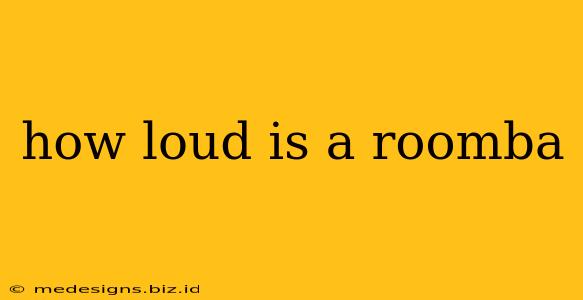Are you considering buying a Roomba but worried about the noise it might make? You're not alone! Noise levels are a significant concern for many potential buyers. This comprehensive guide will explore the typical sound levels of Roomba robotic vacuums, helping you determine if a Roomba's noise level will fit your lifestyle.
Understanding Roomba Noise Levels
The sound a Roomba makes isn't a single, fixed decibel level. Several factors influence how loud your Roomba will be:
-
Roomba Model: Different Roomba models have different motors and designs, leading to variations in noise output. Newer models often incorporate noise-reduction technology, resulting in quieter operation. Some models are explicitly marketed as quieter than others.
-
Surface Type: Cleaning on carpets typically produces more noise than cleaning on hard floors. The friction and suction required to clean carpets generate more sound.
-
Cleaning Mode: More intense cleaning modes, such as those designed for deep cleaning or pet hair removal, tend to be louder than standard cleaning modes.
-
Obstacles: Encountering obstacles like furniture legs, rugs, or wires can cause temporary increases in noise as the Roomba navigates around them.
-
Maintenance: A clogged dustbin or brush roll can strain the motor, leading to increased noise. Regular cleaning and maintenance will help keep your Roomba running quietly.
Decibel Levels: What to Expect
While specific decibel readings vary by model, a general range for Roomba noise levels is 60-70 decibels (dB). This is roughly comparable to the sound of normal conversation.
-
Quiet Models: Some newer Roomba models boast noise levels closer to 60 dB, making them relatively quiet and unobtrusive. This is comparable to the hum of a refrigerator.
-
Louder Models or Situations: Older models or situations with increased cleaning intensity might reach 70 dB, similar to the sound of a vacuum cleaner.
Is a Roomba Too Loud for You?
Whether a Roomba is too loud depends on your individual sensitivity to noise and your living environment. Consider these factors:
-
Your Hearing Sensitivity: If you are highly sensitive to noise, even a quieter Roomba might be bothersome.
-
Your Living Space: In a small apartment or quiet home office, even moderate noise levels can be disruptive. In a larger, noisier home, a Roomba's sound might be less noticeable.
-
Your Schedule: If you primarily run your Roomba while you are away from home or asleep, the noise level might be less of a concern.
Tips for Minimizing Roomba Noise
Here are some ways to reduce the noise produced by your Roomba:
-
Choose a Quieter Model: Research different Roomba models and prioritize those with lower decibel ratings.
-
Regular Maintenance: Keep your Roomba's dustbin and brush rolls clean and free of obstructions to prevent excessive motor strain.
-
Optimize Cleaning Schedules: Run your Roomba during times when noise is less disruptive, such as when you are at work or out of the house.
Roomba vs. Traditional Vacuum Cleaners
While Roombas can be noisy, they are generally quieter than traditional upright or canister vacuums. This is particularly true for the quieter Roomba models.
In Conclusion:
The noise level of a Roomba is a key consideration. While some models are surprisingly quiet, others may be more audible. Carefully weigh the noise level against your individual needs and living situation before purchasing a Roomba. Remember to always check the specific decibel rating for your chosen model. Happy cleaning!
